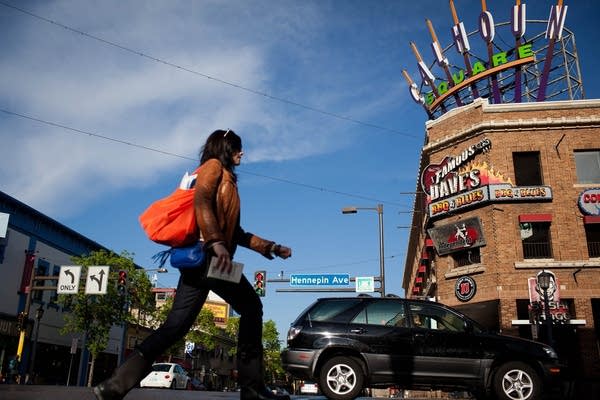Minnesotans not paying attention to fiscal cliff
Go Deeper.
Create an account or log in to save stories.
Like this?
Thanks for liking this story! We have added it to a list of your favorite stories.

If Congress and President Obama don't reach a deal to resolve the fiscal cliff before the end of the year, a series of tax hikes and federal spending cuts will kick in on Jan. 1.
If Americans react to those tax increases by spending less, the fragile economy could tumble back into recession.
Economists fear that a drop in consumer spending, which makes up about 70 percent of the economy, will prompt businesses to pull back as well, possibly resulting in layoffs. The cycle of retrenchment that fueled the last recession would then repeat itself.
But many Minnesotans aren't paying much attention to the fiscal cliff.
Turn Up Your Support
MPR News helps you turn down the noise and build shared understanding. Turn up your support for this public resource and keep trusted journalism accessible to all.
"I've heard of it, but I'm not 100 percent sure I understand what they're talking about," said Lanika Dillon, who runs a computer business.
"I don't have a very deep knowledge about it. But I know what it is," said Mifta Yimam, who works at Mall of America.

"I'm almost at a point where I don't want to follow the stories," said Val O'Sullivan, who works at a media company. "I'm not in the mood for the gloom and doom."
Rich or poor, these people had one thing in common -- they pretty much saw the fiscal cliff crisis as an abstract problem that doesn't have much to do with them. And they weren't too worried about how their own taxes could go up.
"Me myself, I just roll with it," said Brian Sorrelman, who lost his job six months ago due to what he described as a problem with the law. "I do what I can with what I got."
A lawyer, whose household income exceeds $100,000, had a similar response.
"It could affect me. I'm not terribly worried," he said.
But then we showed these people a chart outlining the tax increases that would likely kick in if the U.S. goes over the fiscal cliff.
Tax consequences for U.S. households of the "fiscal cliff"
| Household income: | Average 2013 tax increase: |
|---|
$0 - $20,113 $590 $20,114 - $39,790 $1,327 $39,791 - $64,484 $1,942 $64,484 - $108,266 $3,415 $108,267 and above $12,964
Average for all households: $3,637 Source: Tax Policy Center
The numbers, which were compiled by the nonpartisan Tax Policy Center, show that middle-income families would pay an average of $2,000 more in taxes next year under the fiscal cliff scenario. People who earn the highest incomes would see their taxes increase by four or five times that.
But whether the estimated tax bite ranged from $500 to $13,000, almost everyone we talked to winced at their potential tax bill.
"That's too much," said Yimam.
"Well, my goodness, that's quite a lot," said O'Sullivan.
"Gosh, I'd be very broke. [I'm] already very broke. Money hurts," said student Jessica Berghoff.
Tom Stinson, Minnesota's state economist, said it's not surprising that people experienced sticker shock. This is what he and other economists dread will happen in January if there's no budget deal, and consumers get their first paychecks of the year.
"There's going to be $10 or $20 or $30 less per week to spend," Stinson said. "I think a lot of people are going to be oblivious to what's going on until they get check one and check two for 2013."
There will be some Americans who keep spending freely despite any tax increases. But, Stinson said even he will retrench if taxes climb. Economists aren't that different from most everyone else.
Dear reader,
Political debates with family or friends can get heated. But what if there was a way to handle them better?
You can learn how to have civil political conversations with our new e-book!
Download our free e-book, Talking Sense: Have Hard Political Conversations, Better, and learn how to talk without the tension.





